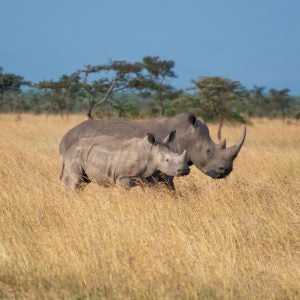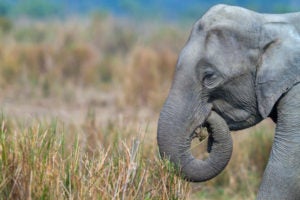Humane Society International / Global
Author: Kristin Stone
Humane Society International / Australia
Say NO to elephant rides, dolphin shows, fur fashion, mouse poisons and traps, animal souvenirs, delicacy meats, cruel circus tricks and sad selfies!
Humane Society International / Global

Around the world, many thousands of wild animals are exploited for human entertainment, food, fashion and frippery, or killed or injured through poisons and traps, not only causing immense animal suffering but also threatening many species with extinction. According to a UN report, species extinction is accelerating at an unprecedented rate, with direct exploitation by people a top threat. So here are Humane Society International’s top tips for how to be a wildlife warrior.
Teresa M. Telecky, Ph.D. vice president of wildlife at Humane Society International, says: “The best way to stop animal cruelty is to refuse to take part in it. By saying no to riding elephants in Asia who have been brutally captured and trained, by refusing to pose for selfies with wild animals exploited for their whole lives for tourism, and by mouse-proofing our homes and habits instead of reaching for the poison, we can all be wildlife warriors. Change starts with each of us, we have the power to make a difference for wildlife.”
Be an animal-friendly traveller
Avoid cruel and exploitative activities such as riding elephants and camels when on holiday. Elephant rides, treks and interactions are promoted to tourists in South Africa and across Asia, especially in India and Thailand. The elephants are usually caught as babies from the wild and brutally ‘broken’ to accept riders. A similar fate can face camels forced to give endless rides to tourists in Egypt. These animals perform repeated tourist duties without rest breaks or proper shade and refreshment. They receive little or no veterinary treatment for injuries, can be chained for hours, and suffer cruel training methods such as beating with whips and sticks. Instead of riding animals, hiring bicycles is a fun alternative, or take things slow on foot under your own steam.
Don’t mistake exploitation for entertainment
Exploiting wild animals in captivity is not acceptable as entertainment. The natural marine habitat of whales and dolphins, for example, cannot be replicated in captivity, and swimming with dolphins increases demand for captive animals, including from brutal “drive fisheries” such as the Taiji hunt in Japan. Unfortunately, dolphinariums can still be found in countries such as the United States, Japan, China, the UAE and many European countries like Greece and the Netherlands.
Poor quality zoos can also be an animal welfare nightmare, keeping wild species in deprived conditions which fail to meet their complex physical and psychological needs, and denying them proper care. Sadly, these can be found all over the world, and in countries like Indonesia, Thailand and China display can also involve forcing animals to perform circus-like acts for which they are subjected to repetitive and stressful training. It’s far better to see animals in the wild on a safari where you can observe their natural behaviour without disturbing them.
Don’t buy wild!
Souvenirs made from wild animal parts such as sea turtle shell, fur or ivory means that an animal has suffered for your trinket, and you may be supporting the poaching and trafficking of wild animals. Instead, support the local community by buying a painting, carving or animal-free craft item by a local artisan.
Say no to sad selfies!
Never pay to have your photo taken with wild animals such as parrots, monkeys or wild cats such as tigers at temples in South East Asia. These animals are often stolen from the wild and sedated with drugs to make them easier to handle. They can also be beaten, and have their teeth or claws removed. In South Africa, thousands of lions are bred in captivity and taken away from their mothers at an early age to be used as photo props for tourists. Once the cubs have grown bigger, they are used for ‘walking with lions’ tourist experiences, and then eventually sold to be killed in canned hunting operations or for the lion bone trade.
Reject ‘delicacy’ meat
The capture and consumption of wild animals such as bats, primates and rats sustains a vast global trade that not only causes immense suffering for hundreds of thousands of animals every year, and encourages exploitation of endangered species, but also poses a severe human health risk. The coronavirus crisis has been linked to the trade in wild animals for human consumption in wet markets in Wuhan, China, and this trade has spawned a number of global health crises in the past. More than 70 million sharks are also killed annually for shark fin soup. The trade involves cutting off a shark’s fin, often while the animal is still alive, and dumping the shark back into the sea to die slowly. Don’t be tempted to eat wild animals as “bucket list” items when traveling, as it merely perpetuates this brutal and often illegal trade.
Don’t wear fur
Millions of foxes, mink, raccoon dogs and coyotes die every year for fashion. Confined in small, wire-mesh cages on factory farms or captured by painful metal traps in the wild, their fur is turned into frivolous trim on coats, hats and accessories. These terrible conditions can create psychological disorders, causing animals to repetitively pace and even self-mutilate. Killing methods are brutal; mink are gassed and foxes and raccoon dogs are electrocuted or, in some countries like China, beaten to death. Fur is also incredibly polluting, as the dressing and tanning processes which stop the animal’s skin and pelt from decomposing naturally rely on toxic chemicals such as formaldehyde, cyanide, lead and chromium which can be released into waterways and devastate wildlife. The future of fashion is compassion, so choose a cruelty-free alternative fabric instead and leave fur where it belongs, on the animals!
Be nice to mice and rats
Wild animals like mice and rats are often subjected to cruel extermination methods such as slow poisoning or glue traps. Glue traps immobilise but don’t kill animals who get stuck in them. Small animals may be left to starve to death or die of their injuries over the course of hours, sometimes pulling or biting off their own limbs in a desperate attempt to escape the traps, or even suffocating from falling face-first into the glue. Using poison can not only cause mice and rats to suffer a slow and agonizing death, it is also a threat to other wildlife and pets who come into contact with the poisoned animal. It’s far kinder to rethink rats and mice as wild animals who live alongside us, but sometimes in unwanted places from which we must encourage them to leave. HSI advocates the use of non-lethal deterrent and eviction methods that are not only more humane but also more effective in the long term. By blocking access points, removing food sources, using welfare-friendly deterrents such as mouse-mesh, and as a last resort relocating individuals using a live-capture trap, we can keep our homes and gardens rodent-free. More information can be found here: https://www.hsi.org/news-media/humane-rodent-solutions/
Indonesia, India, Vietnam among countries where wild animal markets pose a disease risk
Humane Society International / Global

WASHINGTON —Wildlife campaigners across the globe from animal charity Humane Society International have called for an urgent worldwide ban on the wildlife trade after China’s announcement that it will prohibit the buying and selling of wild animals for food in light of the mounting threat associated with coronavirus. The capture, market trade, and butchery of wild animal species for human consumption happens across large parts of Asia and Africa such as Indonesia, India, Vietnam, and West, Central and East Africa, as well as in Latin America, says HSI, posing a very real threat of spreading zoonotic and potentially fatal diseases. Governments around the world must take China’s lead and shut down this trade for good. HSI leadership in South Africa, Nepal, India, South Korea, Canada, the United States, Australia, Guatemala, Sri Lanka, Vietnam, the United Kingdom, Honduras, El Salvador and Costa Rica have joined the call for global action.
Jeffrey Flocken, HSI president, says: “China has taken decisive action to halt the wildlife trade for human consumption implicated in the global coronavirus crisis, but it would be a grave mistake for us to think that the threat is isolated to China. The capture and consumption of wild animals is a global trade that causes immense suffering for hundreds of thousands of animals every year, including endangered wildlife species being traded to the brink of extinction. The trade can also spawn global health crises like the current coronavirus, Severe Acute Respiratory Syndrome and the deadly bird flu. Wildlife markets across the globe, but particularly in Asia and Africa, are widespread and could easily be the start of disease outbreaks in the future.”
In the north eastern states of India, wild species such as the Chinese pangolin and several species of wild birds are routinely sold for human consumption. Bengal monitor lizard meat is also consumed across India, driven mainly by the superstitious belief that the fat stored in the tail can cure arthritis, and meat from the Indian flap-shell turtle is also popular across the country, despite both species being listed under Schedule 1 of the Wildlife Protection Act, 1972. In some north Indian states, owl eyes are also consumed for their perceived medicinal benefits for human vision.
Indonesia also has hundreds of “extreme” animal markets where the conditions are the same as those described by scientists as the perfect breeding ground for new and deadly zoonotic viruses, such as coronaviruses. Wild animals are sold and slaughtered in public and unsanitary conditions. The trade takes place alongside that of dogs and cats which itself has already been shown to pose a risk of rabies transmission. In January this year, Humane Society International wrote to Indonesia’s President Joko Widodo as part of the Dog Meat Free Indonesia coalition, calling for urgent measures to ensure that Indonesia does not become the next point of origin of a deadly virus by tackling the risk posed by these animal markets.
Mr. Flocken adds: “We already know that dog and cat meat markets in Indonesia are a hotbed for disease transmission, and we also know from our investigations that rabies-positive dogs are being sold and slaughtered for consumption in these markets. Given that dogs are caged and slaughtered alongside wild animals such as snakes, bats and rats, Indonesia must surely take preventative measures now to ensure it does not become the next point of origin of a deadly virus. Similar risks can be observed in wild animal markets across the globe and especially in Asia and Africa. The trade in wildlife is a global crisis that calls for global action, now.”
Wild meat consumption is also an issue in Vietnam where wild pig, goat and bird species are eaten as well as softshell turtle, bear, snake, pangolin and civet, and snake wine is also consumed. A number of studies conducted in recent years reveal that a significant percentage of the Vietnamese population consumes wild animals.
Bush meat, including that derived from primates, is still consumed in many parts of Africa. Earlier this month, the Tanzanian government endorsed the establishment of butcheries specifically for the bushmeat trade. And in South Africa, approximately 12,000 lions are captive bred in deplorable conditions, to facilitate the export of lion skeletons to Southeast Asia for tiger bone wine. Lions are hosts for the tuberculosis (TB) virus, which can survive in bones ground to powder.
In Guatemala and El Salvador, meat from crocodile, iguana and other reptiles is often eaten during Lent despite it being illegal to do so.
This week, the National People’s Congress, the Chinese national legislature, elevated an originally temporary ban on wildlife trade for human consumption from an administrative action to the level of a national law. Specifically, the announcement, issued as an emergency measure, creates a comprehensive ban on the trade in terrestrial wild animals bought and sold for food, including those who are bred or reared in captivity.
Download video footage of Indonesia’s wild animal and dog/cat meat markets here: https://www.dropbox.com/home/Indonesia%20Extreme%20Markets
ENDS
Media contact: Wendy Higgins whiggins@hsi.org
Humane Society International

SEOUL—Global animal welfare organization Humane Society International has presented a petition with 83,232 signatures against dog cloning to the Korean Ministry of Agriculture, Food and Rural Affairs, urging the Ministry to permanently cease funding research to clone working dogs. HSI’s petition came in response to disturbing footage obtained by the Beagle Rescue Network in 2019, showing cloned dogs created through MAFRA-funded research being used for training in cruel conditions. After their rescue, one dog died as a result of multiple factors including obvious malnutrition and another dog is being treated with strong painkillers due to severe stress caused by the training
HSI’s Senior Policy Manager for Korea Borami Seo said, “As a proud Korean, I am deeply disturbed to learn that our government ministries have been using public tax money to fund frivolous animal cloning tests to breed sniffer dogs for airport security, and that they were doing so without regard for ethical or welfare concerns that are inherent in a highly experimental procedure like cloning. No other government among the OECD countries has funded cloning of sniffer dogs, nor should such experiments ever have been approved or funded in Korea. HSI, along with 83,232 supporters, urges MAFRA to pull the plug on this frivolous dog cloning research once and for all.”
MAFRA’s five-year Master Plan for Science and Technology published last December identified animal cloning technology as a strategic priority. Examples of publicly-funded projects in the past three years include customization and production of cloned dogs for Alzheimer’s and other human disease research, production of cloned pigs and the development of mass production technology for cloning black cattle for agricultural purposes.
Cloning is an invasive and distressing procedure that inflicts pain and suffering on many animals, not just the ‘end’ product clones. The process to create a single cloned animal is inefficient, potentially requiring hundreds of fertilized eggs, which are then implanted into surrogate mothers. Once they have played their part, the fate of the surrogates and the donor animals is often unknown.
Since the Beagle Rescue Network exposé, the MAFRA-funded sniffer dog cloning project has been suspended. MAFRA is currently revising Animal Protection Act regulations related to working dogs for testing, and HSI and others have called on the agency to prohibit any further cloning testing using working dogs.
*Further reading (Korean only): HSI’s statement on dog cloning for detection dogs
END
Media contact: Borami Seo, bseo@hsi.org
Humane Society International / China

BEIJING– The city of Shenzhen could become the first in China to ban the eating of dog and cat meat, after a food safety legislative proposal has been drafted in response to the coronavirus outbreak. The proposed law focuses mainly on prohibiting the consumption of wildlife such as snakes, turtles and bats, and the inclusion of cats and dogs has been added specifically in acknowledgement of their status as companion animals rather than for any disease risk fears. The proposal has been welcomed by Humane Society International as having the potential to start a precedent in China to crack down on a trade that sees an estimated 10 million dogs and 4 million cats killed for meat annually.
Shenzhen’s legislators will await public responses to the proposed ban before turning it into law.
Peter Li, China policy expert for Humane Society International, said: “It would be extremely welcome for dog and cat meat consumption to be banned in Shenzhen, particularly because the proposal specifically recognises dogs and cats as companions who must be protected from this brutal and largely illegal trade, a sentiment that could have huge ramifications for the millions of dogs and cats who are stolen across China for human consumption.
Although the trade in Shenzhen is fairly small compared with the rest of the province, Shenzhen is still a huge city and is larger than Wuhan, so this would be very significant and could even have a domino effect with other cities following. Already in Yulin where the notorious dog meat festival is held, most dog slaughter operations have temporarily shut down in the last two months because no dogs are allowed to be transported across provincial boundaries. Although World Health Organisation advice is clear that dogs and cats pose no known coronavirus threat whatsoever, it’s no surprise that attention is turning to this trade at this time. The dog meat trade causes immense cruelty to our companion animals and poses a huge human health risk for other diseases such as rabies.”
Facts about China’s dog meat trade
- Thirty million dogs a year are killed across Asia for meat. There are estimated to be more than 91.49 million dogs and cats kept as pets in China. An estimated 10 million dogs a year are killed for China’s dog meat trade.
- The World Health Organisation warns that the dog trade spreads rabies and increases the risk of cholera.
- Most people in China don’t eat dogs, in fact dog meat is only eaten infrequently by less than 20% of the Chinese population. A 2017 survey revealed that even in Yulin, home of the notorious dog meat festival, most people (72%) don’t regularly eat dog meat despite efforts by dog meat traders to promote it. Nationwide across China, a 2016 survey conducted by Chinese polling company Horizon, and commissioned by Chinese group China Animal Welfare Association in collaboration with Humane Society International and Avaaz, found that most Chinese citizens (64%) want to see an end to the Yulin festival, more than half (51.7%) think the dog meat trade should be completely banned, and the majority (69.5%) have never eaten dog meat.
- Dog thieves snatch dogs and cats from the streets, as well as steal them from back yards.
- Dogs and cats are typically bludgeoned to death in front of each other, put in the de-hairing machine to remove fur, and the carcass blow-torched for sale to markets. Dog slaughter continues to occur in public places, exposing young children to horrendous brutality and potentially desensitizing China’s younger generations.
Download video and photos of China’s dog meat trade: https://newsroom.humanesociety.org/fetcher/index.php?searchMerlin=1&searchBrightcove=1&submitted=1&mw=d&q=YulinDogMeat0618
ENDS
Media contact: Wendy Higgins, whiggins@hsi.org
Humane Society International / Global

Gandhinagar — Representatives from more than 130 nations agreed to vital protections for migratory wild species at what’s being hailed as a landmark wildlife convention in Gandhinagar, India. Delegates agreed to increased or first-time conservation protection status for the endangered Mainland Asian elephant, the critically endangered great Indian bustard and Bengal florican, the jaguar, the oceanic whitetip shark, smooth hammerhead and tope shark. The circumstances of all of these species, require multi-nation conservation co-operation because their ranges traverse country boundaries.
Sixty percent of Mainland Asian elephants are found in India, and the species has been listed as Endangered in the International Union for Conservation of Nature (IUCN) since 1986, a victim of habitat loss and increasing human/elephant conflict. The great Indian bustard, whose population has dwindled to around 150 individuals in India, is persecuted by hunting in Pakistan, and the Bengal florican has a population of less than 1000 birds, struggling to survive amidst habitat loss in India and Nepal.
Mark Simmonds OBE, senior marine scientist at Humane Society International, said: “With estimates of up to one million species at risk of extinction right now, nations have a shared responsibility to act, especially in the case of migratory species. Species such as the Asian elephant and hammerhead shark are in desperate need of attention and cooperation from the countries through which they roam, mate, give birth or feed. This truly is proving to be a landmark wildlife convention because we’ve successfully secured increased conservation protection status for many species and we can now set to work on concrete measures to protect them and their habitats.
The Asian elephant is endangered throughout much of its range, trying to survive in continually shrinking, degraded and fragmented habitat, and increasingly coming into conflict with people. Its protection will be vastly improved if range countries work together to tackle these challenges, and inclusion in CMS Appendix I will significantly aid that.”
Rebecca Regnery, Humane Society International’s deputy director of wildlife, said: “The jaguar, the largest native cat of the Americas, is now absent from more than 77% of its historic range in Central America. Despite protection in all its range states, the jaguar is threatened by illegal killing and trade. Listing on CMS will formalize range state collaboration on conservation efforts, creating an international legal framework for the first time. This will provide increased incentives and funding opportunities for this work, which is critical for curbing habitat destruction, maintaining key migration corridors and reducing violence and human deaths associated with retaliation and trafficking.”
Lawrence Chlebeck, marine biologist with HSI Australia, said, “This is a fantastic success for international shark conservation efforts. Three of the shark species hardest hit by commercial fishing will, from today, receive brand new international attention and coordination. Sharks are especially susceptible to population decline due to late maturation and low reproductive potential, and they are therefore some of the most threatened animals on our planet. International, cooperative conservation measures, such as those that will result from these listings, are absolutely vital to the ecological viability and survival of these species.”
Summary of key decisions today at CMS CoP 13
- Mainland Asian elephant/Indian elephant (Elephas maximus indicus) added to Appendix I
- Great Indian bustard and Bengal florican added to Appendix I
- The jaguar (Panthera onca) added to Appendices I and II
- The antipodean albatross (Diomedea antipodensis) added to Appendix I
- Oceanic whitetip shark (Carcharhinus longimanus) added in Appendix I
- Smooth hammerhead shark (Sphyrna zygaena) added to Appendix II
- Tope shark (Galeorhinus galeus) added to Appendix II.
These decisions have been made in the convention’s ‘Meeting in the Whole’ and are subject to formal verification in the closing plenary of the CoP on 22nd February. However, as they have been agreed by consensus, this is now a formality.
ENDS
Media contact: Wendy Higgins whiggins@hsi.org
Humane Society International / China
Humane Society International / India

JAMNAGAR — Humane Society International/India, under its community driven program “Abhay Sankalp,” conducted its second two-week long sterilization and vaccination camp for street dogs in Gokul Nagar. The drive was supported by partner, MP Shah Family, and Municipal Commissioner Satish Patel. Residents and community volunteers from the Ayodhya Nagar, Ramnagar and Murlidhar societies participated in the camp.
Abhay Sankalp is a community-driven campaign to stabilize street dog populations and foster a positive long-term relationship between the dogs and local residents. HSI/India provided experienced vets, trained animal welfare officers, a surgery van with essential tools and medicines, and another van for transporting dogs for treatment.
Ninety-eight street dogs were successfully sterilized and vaccinated and then returned to their original location. In addition, five residents brought their pet dogs to the drive for care. The community engagement team is working to ensure that all of the treated street dogs are taken care of and fed by their communities.
Keren Nazareth, interim director for HSI/India’s companion animals program, says,” Jamnagar is the first city in India where the Abhay Sankalp campaign is leading community-based animal sterilization. This is a unique initiative which can only be taken forward with the full support of the municipal corporation and its people.”
Ramesh Bhai, a resident of Gokul Nagar, says, “We want to keep all dogs healthy in our society, and to do that, proper sterilization and vaccination is necessary. By participating in this camp, we aim to promote peaceful co-existence between humans and dogs and to make our society rabies free.”
Ashokbhai Shah of MP Shah Family states, “I’m glad that the joint efforts by MP Shah Family and HSI/India have connected so many people to issues related to dogs. It’s amazing to see residents helping the team catch dogs and making the camp their own by contributing in one way or the other. We urge the Jamnagar Municipal Corporation to begin a full-fledged sterilization program for a greater impact.”
Since its launch in October 2018, Abhay Sankalp has been working with neighborhoods across the city to understand their concerns regarding street dogs and facilitate a better understanding of rabies, dog behavior and other aspects of street dogs living in each neighborhood. Over 108 residential societies have signed up with Abhay Sankalp to promote harmonious coexistence between street dogs and people. The program also operates in Vadodara, Dehradun and Lucknow.
END
Media Contact: Uma Biswas, +91 8758807223, ubiswas@hsi.org
#BeCrueltyFree Canada once again joins forces with Alberta-born campaign partner
Humane Society International / Canada

MONTREAL–This Valentine’s Day the Canadian government received a very special video message from actress Tricia Helfer (Van Helsing, Lucifer) on behalf of Humane Society International and the #BeCrueltyFree Canada campaign, calling for a federal ban on cosmetic animal testing and trade.
“As a proud Canadian, it breaks my heart to know that my country still allows animal testing for cosmetics,” said Ms. Helfer, who has supported HSI’s #BeCrueltyFree campaign since 2015. “As this next session of Parliament gets underway, we have a renewed opportunity – and obligation – to ensure that our Government steps up and legislates an end to this archaic practice. Have a Heart, Canada – #BeCrueltyFree.”
Ms. Helfer is joined by an overwhelming 87% of Canadians who support a national law to ban animal testing for cosmetics (polling by Insights West in July 2019 on behalf of HSI and Animal Alliance of Canada). Such a move would see Canada join 39 countries that already have similar bans in place.
HSI campaign manager Aviva Vetter said, “We’re grateful to Tricia for using her platform to shine a light on this issue and urge our federal government to take action. More than 1 million Canadians from coast to coast have said no to animal suffering in the name of beauty, and together, we will see an end to this outdated practice.”
Watch Tricia’s video message, and sign HSI’s petition at becrueltyfree.ca to say “no” to cruel cosmetics in Canada.
Broadcast outlets and TV programs can book a live video interview (Skype, FaceTime) with Tricia pending availability and timing. Please call or email media contact below.
-30-
Media Contact: Christopher Pare – office: 514 395-2914 / cell: 438 402-0643, email: cpare@hsi.org
Humane Society International/Canada is a leading force for animal protection, with active programs in companion animals, wildlife and habitat protection, marine mammal preservation, farm animal welfare and animals in research. HSI/Canada is proud to be a part of Humane Society International which, together with its partners, constitutes one of the world’s largest animal protection organizations. Celebrating animals and confronting cruelty worldwide – on the web at www.hsicanada.ca.
Humane Society International’s #BeCrueltyFree campaign is at the forefront of the global movement to outlaw animal testing for cosmetics. From Europe to India, Australia and Taiwan, our campaign teams have played a key role in driving 39 countries to take action, and our work continues today in Brazil, Canada, Chile, Mexico, South-East Asia and United States.
